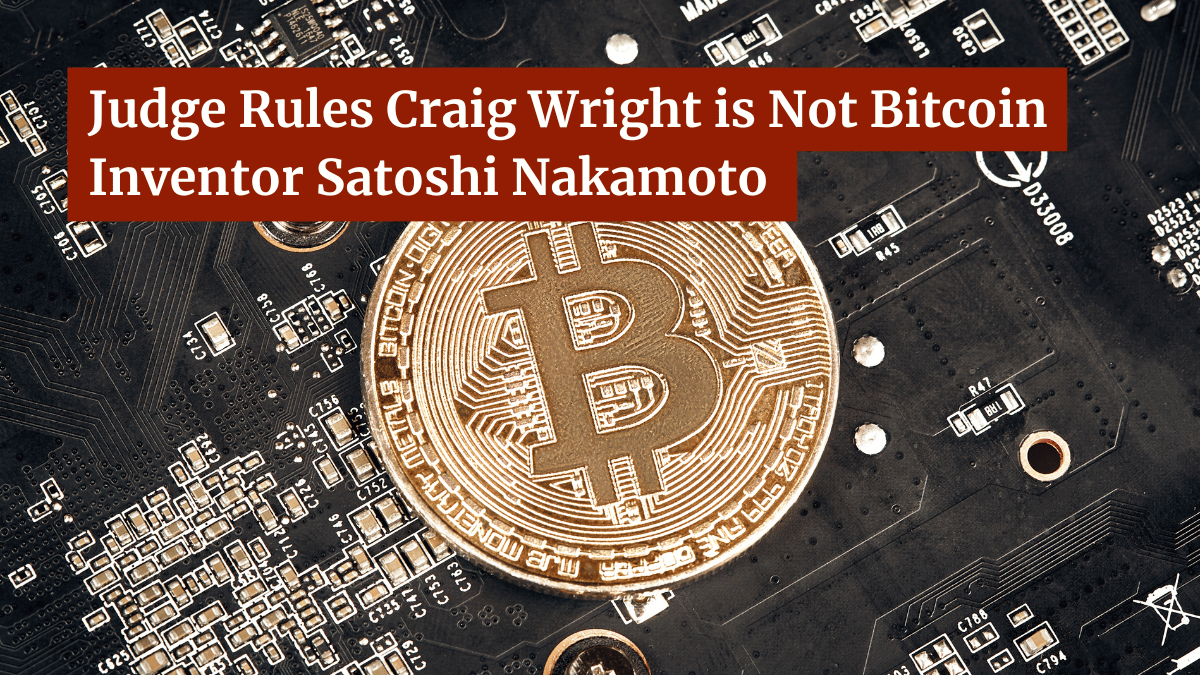Judge Rules Craig Wright is Not Bitcoin Inventor Satoshi Nakamoto

In 2008, a pseudonymous person (or group) using the name Satoshi Nakamoto published the original whitepaper for Bitcoin. That paper outlined the vision for a peer-to-peer electronic cash system that would go on to become not just the foundation for Bitcoin but for cryptocurrency as a whole.
The identity of Satoshi has never been confirmed, however, for nearly the past decade, Australian computer scientist Craig Wright has claimed, through various channels, to be Satoshi.
Those claims have taken various forms including multiple high-profile news articles, a copyright registration with the United States Copyright Office and multiple libel lawsuits in the United Kingdom against those who claimed he was a fraud.
However, that skepticism was not without cause. Despite repeatedly claiming to have been Satoshi, Wright never provided any significant or verifiable evidence to support that claim. Even the copyright registration failed to prove anything as the Copyright Office released a statement that it does not investigate claims of authorship and a duplicate claim was filed by one of Wright’s detractors.
But, as skeptical as most experts were of those claims, Wright now appears to have now been dealt a fatal blow in his battle. Following a five-week trial in the UK, a judge has ruled definitively that Wright is not Satoshi Nakamoto.
Stating that the “evidence was overwhelming” the judge ruled that Wright is not the person behind the Satoshi moniker and is not the inventor of the Bitcoin system. Whether this will fully end Wright’s claim to be Satoshi remains to be seen, but it will make attempts to press those claims much more difficult, especially in the UK.
To understand why this decision is important, we first must look at Wirght’s history with the claims and the case itself.
The History of the Case
In December 2015, two separate articles, one in Wired and one in Gizmodo, claimed that Wright was likely Satoshi, a claim that was supported by some prominent members of the Bitcoin community.
However, skepticism began to grow over Wright’s claim as evidence he provided failed to hold up under scrutiny. This led to a divide over Wright’s claims in the cryptocurrency community, with detractors and supporters often engaging in heated exchanges.
In 2018, Wright launched Bitcoin Satoshi Version, better known as Bitcoin SV (BSV). According to Wright, this fork was the original Bitcoin and addressed many of the technical challenges that had plagued Bitcoin in previous years.
However, the chorus of skepticism only grew louder and resulted in Wright filing a series of libel lawsuits in the United Kingdom and Norway. Though Wright did have some legal success, judges repeatedly admonished Wright for not telling the truth or putting forth a “deliberately false case.”
Wright also attempted to use copyright to leverage his position. In one case, he attempted to sue developers of Bitcoin and Bitcoin Cash, saying that those currencies violated his copyright in the Bitcoin file format. He lost that case in February 2023, but on the grounds that there is no copyright protection in the file format. The case did not weigh in on whether he was Satoshi.
It was amidst this flurry of legal activity that, in April 2021, the Cryptocurrency Open Patent Alliance (COPA) filed a lawsuit against Wright. Representatives for Wright had sent Square, one of the founding members of COPA, a cease and desist. That prompted a strongly worded written response from COPA and the lawsuit itself.
The case went to trial in February with Wright presenting a wide variety of evidence to support his claim. However, according to COPA, the evidence was almost exclusively recent creation and cited some 20 alleged forgeries. This list includes documents that had recent timestamps from Grammarly and fonts that did not exist in 2007.
The trial concluded today. It was anticipated that the judge would take time to weigh the case and issue a ruling sometime later. However, the judge opted instead to issue a ruling immediately following the conclusion of proceedings, saying that the evidence was “overwhelming” that Wright is not Satoshi.
A full written ruling is expected sometime later.
However, even from the bench, the judge made it clear that Wright is not Satoshi Nakamoto, and he is not the person who created the Bitcoin system. It is easily the most definitive ruling on the issue to date.
Though it does not bring an automatic end to other legal action involving Wright, it does make it much more difficult for him to press those cases or continue to claim to be Satoshi.
Why This is Important
Obviously, there is a great deal at stake here. Though there is no way to know exactly how much Bitcoin is in Satoshi’s wallets, it’s estimated to be worth well over $40 billion. That alone makes this possibly the most financially important authorship dispute ever.
However, the much bigger and more important outcome in this case involves Bitcoin and cryptocurrency broadly.
When COPA filed the lawsuit, they claimed Wright was having a “chilling effect” on Bitcoin development and that was likely true. Even just the threat of litigation, be it copyright, libel or otherwise, likely did keep some away.
But, while this is likely a major victory for Bitcoin developers and developers on similar currencies, it is also a major embarrassment for Bitcoin and cryptocurrency at large.
As someone who is focused on authorship and related issues, I have been repeatedly approached by cryptocurrency and blockchain supporters who have tried to convince me that blockchain technology will revolutionize the way we resolve copyright and authorship disputes.
I have long been skeptical of that. Copyright has many issues, but not ones that blockchain technology or cryptocurrency can really address. As we saw in January 2022 when a crypto group purchased a physical copy of Jodorowsky’s Dune and thought it meant they held the copyright to it, crypto communities and developers often lack an understanding of how copyright works, let alone how to fix its issues.
That group would dissolve months later after struggling to resell the book.
However, the dispute over Wright proves that cryptocurrency and blockchain will not resolve authorship disputes. If anything, it makes them worse.
This case could have and should have been the perfect platform for blockchain to prove how it can help resolve authorship disputes. Wright could have easily proven his claims using the blockchain and, when he refused or failed to so, should have been readily dismissed.
But he was not. He gained supporters and, looking at X (formerly Twitter) mentions of him, he still has many out there who believe he is Satoshi, despite the court ruling. For nearly ten years, he has been able to claim, both in and out of court, that he is the creator of Bitcoin with at least some accepting that claim.
In what is literally the most important authorship dispute that Bitcoin or cryptocurrency could ever face could not be resolved by with the blockchain or even with the aid of the blockchain. It had to be resolved in a very old-fashioned way, with a judge, forensics, and expert witnesses. Even then, it clearly is not fully resolved, at least for some people.
The Bitcoin whitepaper says, “What is needed is an electronic payment system based on cryptographic proof instead of trust.” But that proof means nothing if it is not believed or, in this case, the lack of it seen as a reason to dismiss the claims.
If the blockchain could not help resolve this dispute, what dispute can it resolve?
Bottom Line
I have long been fascinated by blockchain technology. It is an interesting idea that, at least theoretically, could have some positive uses.
However, everywhere that blockchain has tried to assert itself, it is felt like a solution looking for a problem. Whether it is video games, NFTs or copyright, blockchain is presented as a solution that ends up creating more problems than it solves.
Nowhere is that more obvious than here. While the judge made it clear that Craig Wright is not Satoshi Nakamoto, that does not change the fact that many believe he still is, it does not erase the near decade of uncertainty and it does not fix the harm that this dispute has caused during that time.
Bitcoin created this dispute and Bitcoin could not resolve it. If cryptocurrency is to be anything other than an anonymous way to send money, often for illicit goods and services, and a dicey investment, this needs to be a moment of reflection for its developers and enthusiasts.
Though I believe the right side won, the system still failed and is continuing to fail even now. There is no easy fix for that. There is no simple patch or change that can address it.
This comes down to a question of what Bitcoin, blockchain and cryptocurrency will be and that is one that I can answer.
Want to Reuse or Republish this Content?
If you want to feature this article in your site, classroom or elsewhere, just let us know! We usually grant permission within 24 hours.
